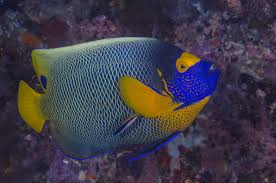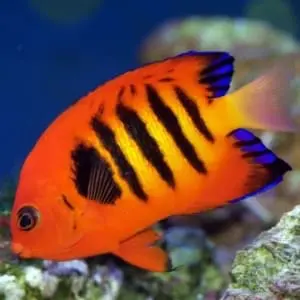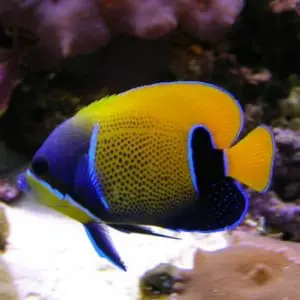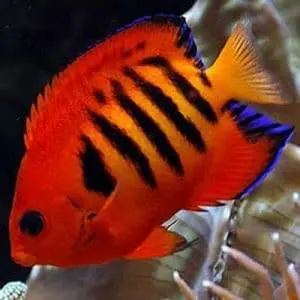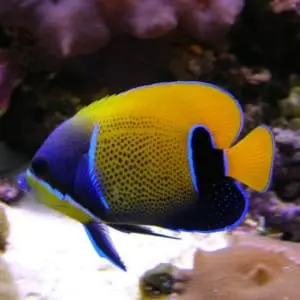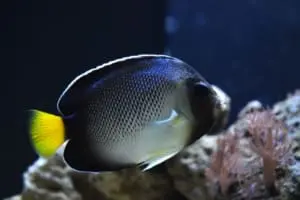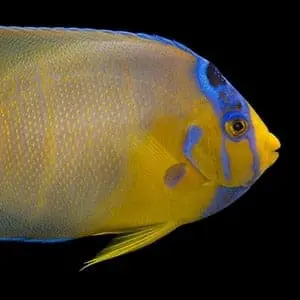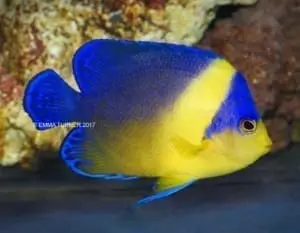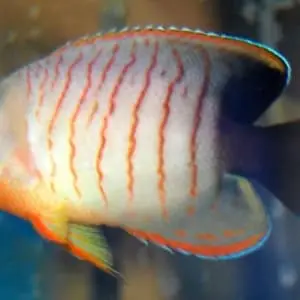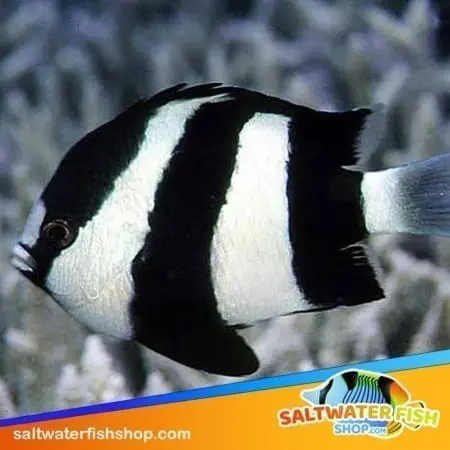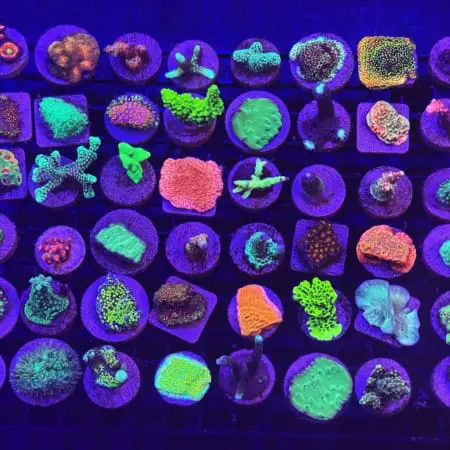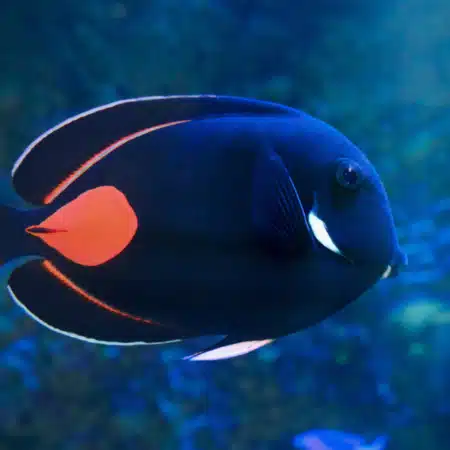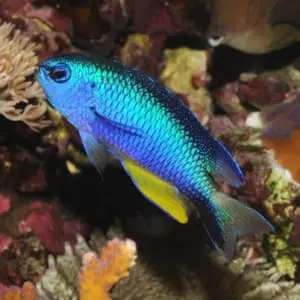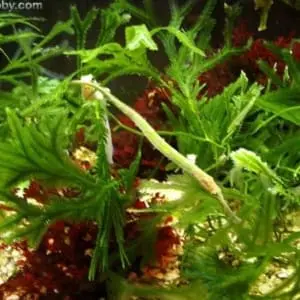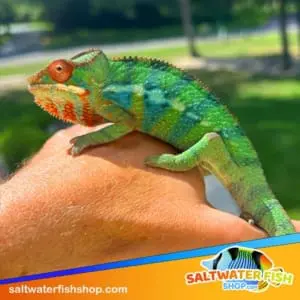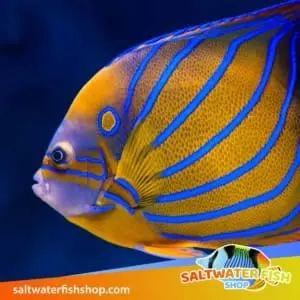Angelfish Water Conditions
The ideal tank conditions for saltwater angelfish depends on the species. In general, an aquarium for these fish must recreate the features of their natural habitat so that the fish will grow up healthy. Consider the following when setting up an aquarium:
Salinity:
Saltwater fish need saline water. Saltwater tanks with reefs have a recommended salinity level of 1.024 – 1.025 . This could be achieved by mixing salt into the aquarium water.
Water hardness:
Angelfish typifcally come from slightly acidic, soft waters, but angelfish adapt well to waters of various hardness and pH.
The magnesium and calcium found in ocean water can be replicated in tanks by adding crushed coral and shells in the aquarium. Tank decorations are sometimes made with calcium in them to be used for this purpose as well.
Oxygen:
Angelfish absorb oxygen from the water through their gills. Dissolved oxygen is necessary for all species of angelfish. They move to the parts of water containing the highest amount of dissolved oxygen.
Oxygen in the tank water is necessary for fish to survive. Bubblers and water filters help oxygen be distributed in the water. Aquariums with wide tops allow oxygen to also enter the water from the surface.
Size:
Freshwater fish are used to smaller spaces than saltwater fish. A bigger aquarium is needed for saltwater angelfish. 20-55 gallon tanks are needed for small angelfish. For medium sized angelfish, a tank of 55-100 gallons is recommended. A large angelfish needs a tank about 100-300 gallons.
Water filtration:
Sea water is often replenished, but the same effect does not occur in a closed container. Toxic waste can build up in the tank if the filter is not changed often enough. Angelfish require a filter. The filter also multitasks to move distilled oxygen around the water, making a bubbler not necessary.
Before purchasing your very own angelfish for sale, be sure to read Salt Water Fish Shop’s angelfish care sheets to ensure proper care and proper angelfish care for your new angelfish.
-
Below you will find detailed information on angelfish care provided by our biologist including the following:
- Angelfish Care
- Angelfish Care Sheet
- Angelfish Origin
- Angelfish tank conditions
- Angelfish size
- Angelfish water filtration
- Angelfish breeding
- saltwater fish store
- Angelfish feeding
- Angelfish tankmates
- angelfish tank
- angelfish lifespan
- angelfish water conditons
- how to care for angelfish
- angelfish diet
Saltwater angelfish are considered one of the most colorful species of saltwater fish. These fish are the reason many aquarium hobbyists start saltwatertanks. These fish are also hardy and easy to care for. Before purchasing your angelfish for sale, it is important to read our angelfish care sheet to ensure proper care for your angelfish for sale.
Origin
Most saltwater angelfish species are found in the Western Pacific. Nine species are found in . the Atlantuc and only four are found in the Indian Ocean/Eastern Pacific area. Saltwater angelfish are often found on shallow reefs in tropical waters.
Angelfish Breeding
If you want to breed your angelfish, you have to prepare and create space for the many fish to come. Breeding angelfish creates many fish. They will need to be transferred into a larger aquarium. Saltwater fish are born females and if dominant, become males. If male angelfish lose their dominance, they become females. You do not need to distinguish the difference between the fish genders. Fish choose their genders depending on what is needed for the situation.
Some fish species find a mate and stay with them, but in some species a male mates with several females. Different species should be kept away from angelfish while they are breeding, because they tend to become territorial.
Marine angelfish eggs float in water full of plankton until they hatch. Eggs are easily consumed this way so fish that eat plankton should not be present in the aquarium at this time.
Angelfish Feeding
When young, a diet of plankton is recommended for angelfish. When older, they like to feed on tunicates, hydriods, sponges and beyozoans (these include seasquirts, jellyfish, animals found in seaweed). It is hard to care for certain species because they will only eat specific foods. An example are Holocanthus angelfish, they only eat fish food made of sponge.
An aquarium with algae in it is good for angelfish care because they enjoy eating it. Larger angelfish eat small crustaceans. They can be kept in the aquarium as extra food for your angelfish.
Suitable Tank Mates For Saltwater Angelfish
Angelfish are a territorial species. They don’t necessarily do well with any other fish in the same tank, even if they are of the same species. One fish per tank is best. Different species of angelfish should not be put in the same tank, unless the aquarium is large.
If you want to keep different types of fish in the same tank, start with the other fish and add the angelfish last. This will make sure the angelfish do not claim all of the territory as there own. It also makes sure the angelfish do not think the other fish are intruders.
Tolerance of other fish depends on the size of the angelfish. Smaller angelfish are usually not aggressive and can live with other fish. They make great tank mates with Blennies, Gobies, Anthias, Butterflyfish and similar species.
Larger angelfish are known to be more aggressive when it comes to keeping them with other fish. If they are kept with other fish, make sure the other species they are being kept with are on the aggressive side as well so the angelfish don’t harm the other fish. Groupers, Damsels, Eels, Triggerfish and Tangs make good additions to angelfish tanks.
When angelfish are younger, it is easier to keep them with other species. This is because at a younger age, they are not territorial yet. When they grow up and start fighting their tank mates, consider moving them to a different tank.
Angelfish Life Span
A typical saltwater angelfish lives up to 15 years with proper angelfish care. As they grow, their apperance (colors and patterns) can change. Many fish owners enjoy watching their angelfish change.

